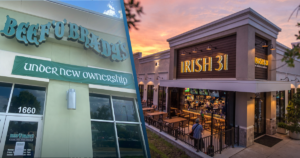 A substantial increase in primary voting in Pasco County is expected to be a bellwether for what could be one of the most anticipated general elections in recent memory on Tuesday, November 6.
A substantial increase in primary voting in Pasco County is expected to be a bellwether for what could be one of the most anticipated general elections in recent memory on Tuesday, November 6.
Turnout for early voting, vote by mail and on primary election day on Aug. 28 were all higher than they were in 2016 in Pasco County and overall, 24.85 percent of registered voters cast ballots, compared to 18.64 percent in 2016 and 14.93 percent in 2014.
Pasco County Supervisor of Elections Brian Corley says overall numbers on Aug. 28 were up, due to the ease of voting, as well as the fact that voters seem to be more engaged this year than they have been in the past.
“There is a caveat,” he says. “While the needle is moving in the right direction and it’s a fantastic increase, that’s still only one in four people voting (in the primary election). It’s not time for confetti, but it is a step in the right direction.”
In Wesley Chapel, more than 10,000 votes were cast, or only 21.9 percent of registered voters. However, take away those not registered with either major party, of which only seven percent voted, and that number is better – 28.6 percent of registered Democrats and Republicans in Wesley Chapel’s voting precincts cast ballots in the primary.
Other than the primaries to choose gubernatorial candidates for each party, there were no hot intra-party races driving people to the polls, and Corley says that could mean a massive turnout for the general election, when the ballot will offer more choices and pit those political parties against each other.

Those additional choices include two Pasco County Commission races that weren’t contested in the primaries, and what will be a heated U.S. Senate race between current Republican Governor Rick Scott and Democratic incumbent Bill Nelson, who has held his position since 2001.
The one race drawing national attention that is expected to drive people to the polls more than any other, however, will be the one to replace Gov. Scott as Florida Governor, between Republican Ron DeSantis and Democrat Andrew Gillum.
Gillum shocked almost everyone with a win in the primary to set up a showdown with the Donald Trump-endorsed DeSantis. Both candidates defeated establishment-backed candidates, setting the stage for an interesting battle that will match contenders from what many believe to be the party’s bases.
Gillum became Florida’s first-ever black gubernatorial candidate after he defeated favored Gwen Graham, the daughter of popular former Florida Governor and U.S. Senator Bob Graham.
Although he was fourth in many polls leading up to the primary vote and was outspent by Graham 6-to-1, there was talk of a Gillum surge in the final days, which turned out to be prescient.
Gillum captured 34.3 percent of the state-wide Democratic vote (or 517,834 votes of the 1,509,794 ballots cast). Graham finished second with 31.3 percent, while Phillip Levine (20.3 percent) and Jeff Greene (10 percent) rounded out the top candidates in the Democratic field.

“People didn’t think we had a chance, but we did,” Gillum told CNN shortly after being declared the winner. “I think voters have had enough with the status quo.”
DeSantis, who was first elected to Congress in 2012, represents the Daytona Beach area and originally ran for the U.S. Senate in 2016, when it appeared that Marco Rubio, coming off an unsuccessful presidential campaign, was not going to run. Once Rubio re-entered the race, DeSantis exited it.
Running behind former Commissioner of Agriculture Adam Putnam at the time, DeSantis fully embraced an endorsement from President Trump in the spring and it shot him into a lead he never relinquished.
DeSantis was the choice of 913,955 of Florida’s Republican voters out of 1,618,372 who cast ballots in the primary, or 56.4 percent. The previously favored Putnam was a distant second with 36.5 percent.
Pres. Trump congratulated DeSantis on the win the night of the primaries, and the next morning, the president attacked Gillum, calling him DeSantis’, “biggest dream…a failed Socialist Mayor who has allowed crime and & other problems to flourish in his city.”
Local Results
In Pasco County, however, Graham was the decisive winner over Gillum, garnering almost twice as many votes, beating the eventual nominee 42.7 percent to 25.1 percent.
In Wesley Chapel, though, Gillum was as clear a choice for Democrats as DeSantis was for Republicans. Both candidates were the top vote-getters in nine of Wesley Chapel’s 13 voting precincts, and both received 54 percent of the votes cast for the top two finishers.
In other races, Allen Altman won a fourth term on the Pasco County School Board with 57 percent of the vote, beating challengers Ken Mathis (23 percent) and Brian Staver (20 percent) for the District 1 seat, joining fellow incumbent Cynthia Armstrong, who retained her District 3 seat.
Tara O’Connor and Megan Harding, who both received 37 percent of the vote for the District 5 seat, will run-off against each other on Nov. 6 because neither passed the 50-percent threshold in the primary.
A pair of Republican county commissioners did not have primary challenges and will be defending their seats on Nov. 6 – Mike Moore, who represents most of Wesley Chapel in District 2, and District 4’s Mike Wells. They will be running against Democrats Kelly Smith and Brandi Geoit, respectively.




No comment yet, add your voice below!